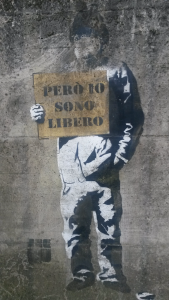The Reader’s Brain
The writer sho uld remember that words are tools designed to fit the system of human understanding. The reader’s brain decodes the information received, but the message received doesn’t always match what was sent. Why?
uld remember that words are tools designed to fit the system of human understanding. The reader’s brain decodes the information received, but the message received doesn’t always match what was sent. Why?
Artists inside
 I have to go back in time to find the first seed, which was planted by a professor of criminology. It was 1980, and the professor was Guido Galli. The seed was concerning human rights, whether people were free, charged, or convicted.
I have to go back in time to find the first seed, which was planted by a professor of criminology. It was 1980, and the professor was Guido Galli. The seed was concerning human rights, whether people were free, charged, or convicted.
At that time I did not realize what Professor Galli wanted to say. I was too self-centered and often not attending classes, including the day they killed him in the corridors of the State University of Milan. [Read]
Leonardo
 The eclecticism of Leonardo da Vinci always strikes me. His curiosity and naturalist intelligence have made him the icon of humanism. I often encounter the works of Leonardo, ranging from the overfamous Mona Lisa all the way to the floodgates on the canals, but lately it seems like he’s giving me a pat on my shoulder in order to get my attention. [Read]
The eclecticism of Leonardo da Vinci always strikes me. His curiosity and naturalist intelligence have made him the icon of humanism. I often encounter the works of Leonardo, ranging from the overfamous Mona Lisa all the way to the floodgates on the canals, but lately it seems like he’s giving me a pat on my shoulder in order to get my attention. [Read]
Leda, the cake designer
 I personally think that cake design is a visual art that should stand out from baking, but she thinks differently, perhaps because she is a perfectionist. For Leda Intorta, in cake design visual and tasting arts must meet and be complementary. She is young, good-looking, and capable; through videos on YouTube she is teaching many sugar paste lovers. Her courses are crowded with artists from all over Italy. [Read]
I personally think that cake design is a visual art that should stand out from baking, but she thinks differently, perhaps because she is a perfectionist. For Leda Intorta, in cake design visual and tasting arts must meet and be complementary. She is young, good-looking, and capable; through videos on YouTube she is teaching many sugar paste lovers. Her courses are crowded with artists from all over Italy. [Read]
Stable of sorrow
 The shiny look on the world of western horse in a psycho-novel that involves and upsets
The shiny look on the world of western horse in a psycho-novel that involves and upsets
I watch you
 I Watch You is “a text that pushes and forces you to chase the absolute need of the last page, towards the final longed for, a shocking and absolutely extraordinary finish.” – Pino Roveredo
I Watch You is “a text that pushes and forces you to chase the absolute need of the last page, towards the final longed for, a shocking and absolutely extraordinary finish.” – Pino Roveredo
 Sibyl (Esther Sibylle) von der Schulenburg was born in Lugano, Switzerland as daughter of two German writers. She grew up bilingual and multicultural, in Germany, Switzerland and Italy. She studied at the Catholic University and then at the University of Milan where she graduated in law. She worked for many years as managing director for a telecom company and traveled a lot in Europe, USA, Canada, Japan and China.
Sibyl (Esther Sibylle) von der Schulenburg was born in Lugano, Switzerland as daughter of two German writers. She grew up bilingual and multicultural, in Germany, Switzerland and Italy. She studied at the Catholic University and then at the University of Milan where she graduated in law. She worked for many years as managing director for a telecom company and traveled a lot in Europe, USA, Canada, Japan and China.
Her first book is the result of a long process of researches in private and public archives, about her father. With ” Il Barone ” ed. Ipertesto Edizioni – Verona (2010), the biographical novel about Werner von der Schulenburg is given to print; the story of a German writer, committed Europeanist and anti-Nazi. The book gets good reviews and the literature prize “Mario Pannunzio 2015”; historians and political scientists are interested in the character and soon the novel is mentioned in historical researches as the source of the official biography of Werner von der Schulenburg and of historical documents hitherto unpublished.
After studying psychology, Sibyl writes a couple of essay on matters such as bilingualism and architectural psychology.
From 2013 on, Sibyl writes and publishes psychological novels, stories of people living in psychic conflicts. At first her novels are published by an American publishing house but in 2014 she goes back to Italy and, since than, she cooperates with Il Prato Publishing House, where she also act as editor and coordinator for two novel collections.
Her writing style is dry and direct: essential. In ” Stable of sorrow ,” the narrator does not use any mentalistic verb, entrusting the detection of mental states to the scenes and dialogues; the style in other novels followed the track. In all the books the rhythm is tightened, the construction of the sentences is simple, the use of adjectives and adverbs limited; frequent is the use of the objective correlative. The author’s ambition is to bring the reader into the scene and let the characters speak. In her writings, Sibyl reveals an Italian culture, restrained, almost governed, by German roots. The description of the places and characters in her novels, give an account of the influence of different literary styles: from Italian romance to German expressionism, crystallized into a personal style.
In more recent years she felt the need to dedicate part of her time to voluntary work and founded the association Artisti Dentro Onlus, through which she aims to bring art and culture to prisons.
Sibyl von der Schulenburg lives and works in the province of Milan with long stays in Tuscany, on the Etruscan Coast.
